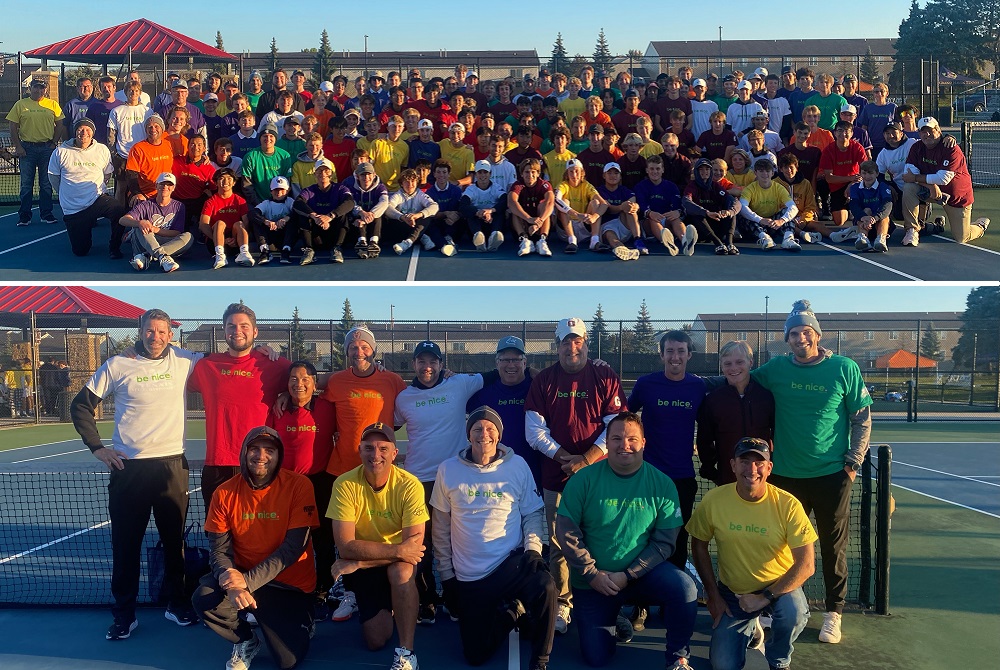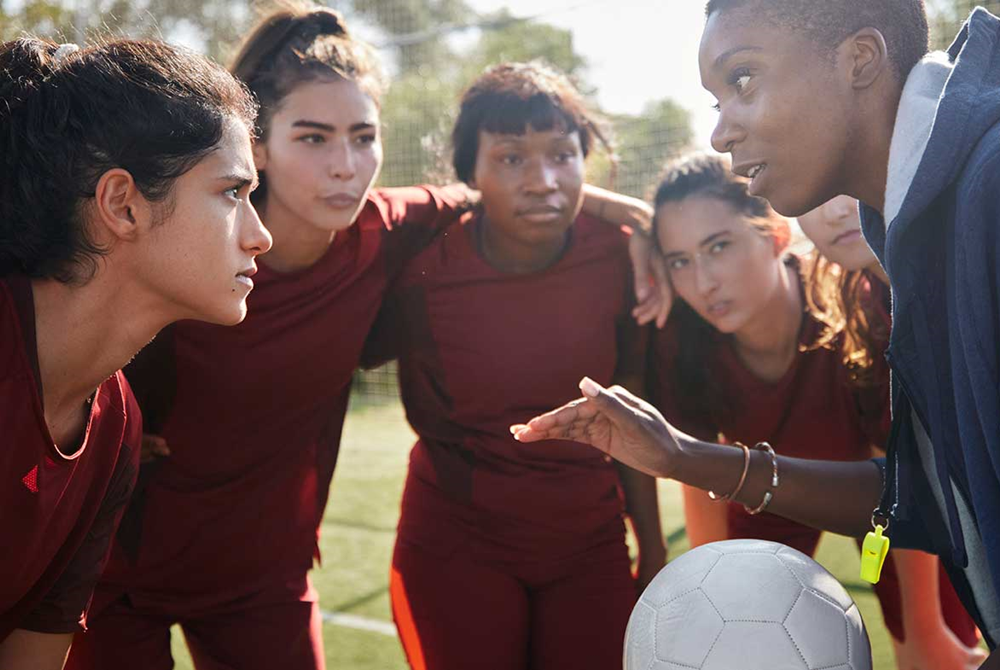
O-K Red Tennis Rivals Team Up to Promote Mental Health Awareness
By
Jon Ross
MHSAA Director of Broadcast Properties
October 7, 2022
The Ottawa-Kent Conference Red boys tennis championship was decided Saturday, but all eight teams also teamed up for something bigger.
All participants from league members Caledonia, East Kentwood, Grand Haven, Grandville, Hudsonville, Jenison, Rockford, and Holland West Ottawa warmed up together, wearing special “be nice.” shirts in their respective school colors.
The Mental Health Foundation of West Michigan provides the be nice. program, with its mission to promote mental health awareness and prevent suicide through education with a four-step action plan (Notice, Invite, Challenge, Empower). Additionally, be nice. provides mental health awareness training to all head coaches of MHSAA-sponsored sport teams.
“Over the past four years, coaches have received mental health and suicide prevention education by learning the be nice. action plan through annual rules meetings. Now these coaches are bringing it to their athletes and parents,” said Christy Buck, executive director of the Mental Health Foundation of West Michigan. “To see these coaches recognize the importance of having mental health discussions on their teams with their athletes gives me the chills. For the entire O-K Red, 140 coaches and athletes, to then take it a step further and bring awareness to their community is incredible. The information people received that day, without a doubt, started important conversations that will be life-changing for someone who was struggling, and that's what we're trying to do. The be nice. team program is simple, accessible, and it's going to save lives."
Leading up to the competition, every team had access to a be nice. team training that taught them to recognize the signs and symptoms of a mental illness and how to take action when they notice these changes. This program is a simple and effective way to empower coaches and athletes with a game plan for mental health concerns. Parents and spectators also were briefed on the be nice. action plan before the tournament began.
“Tennis is competitive and intense in the Red, but for the players and coaches, we see tennis as an extension of something bigger. It's about life, friendships, camaraderie, learning how to deal with adversity, learning how to lose, learning how to win, coming together as a family and creating collective goals,” said Rockford varsity tennis coach Tom Huizing. “Every day we try to live the be nice. way. Not only within our teams or within our conference, but within our lives outside of tennis.
“We've had many be nice. matches within the O-K Red, but now we wanted to set the standard as a conference and let everyone know that we are in this life together. We will notice, invite, challenge, and empower. All of us, not just one player or one coach or one team. Every player, every coach, every team. We want to walk the walk, not just talk the talk. So that's what we're doing on the biggest stage for our tennis conference. We are coming together at the O-K Red Conference finals and we are making a pact as an entire conference to be nice.”
Hudsonville and West Ottawa ended the season as co-champions of the O-K Red.
PHOTO The O-K Red brought together 140 athletes and coaches for its boys tennis championship tournament and also in an effort to bring awareness through the be nice. program. The entire group is pictured above, and the coaches below. (Photo courtesy of be nice.)

Why Athletes Should See A Sport Psychologist
By
Elizabeth Swanson
Henry Ford Health
January 9, 2024
Whether at the professional or intramural level, there are so many benefits to being an athlete. Participating in a sport teaches communication skills, how to overcome adversity—and regular exercise has so many incredible health effects on the mind and body.
 But that’s not to say athletes don’t have their own set of challenges. Pressures to perform, physical injuries and intense schedules can take a toll on anyone’s mental health, which is where a sport psychologist comes in.
But that’s not to say athletes don’t have their own set of challenges. Pressures to perform, physical injuries and intense schedules can take a toll on anyone’s mental health, which is where a sport psychologist comes in.
“It’s helpful that a sport psychologist knows the culture of athletics and the typical stressors that athletes face,” says Seth Swary, Ph.D., a sport psychology clinician at the Henry Ford Center for Athletic Medicine. “We’re familiar with the influence the world of athletics can have on someone and how it can affect their well-being.
“Athletes have a whole team around them to help them perform — athletic trainers, nutritionists, etc.— so why shouldn’t they have an expert who is dedicated to supporting their mental health? A sport psychologist acts as a strength-training coach for the mind.”
Mental Health Challenges That Athletes Face & How Sport Psychology Can Help
Athletes often have a built-in support system: teammates and coaches who know what they’re going through and trainers and physicians who can help manage aches and injuries. But still, it’s not always easy. Some of the difficulties that athletes face include:
- Increased attention on body image. Especially if you play a sport that requires revealing outfits — or a sport with increased focus on weight — it might be difficult to maintain a healthy body image. For some, this can lead to an increased risk of developing an eating disorder.
- The pressure to perform. “If you’re an athlete at the college or professional level and play badly during a game, you get roasted on Twitter,” says Dr. Swary. “But even if you’re not in the public eye, there is pressure to perform — from coaches, teammates, family members.”
- Navigating demanding schedules. “I work with many college athletes and their schedules are packed — practicing at least two hours a day, team meetings, traveling to and from games — and then they’re trying to keep up with school,” says Dr. Swary. “It can be stressful.”
- Debilitating physical injuries. The physical demand of sports can also bring about its own set of challenges — especially when injuries occur. “You’re not only dealing with surgery and rehabilitation, but you’re also out of the game for a while,” says Dr. Swary.
- Making career transitions. “I’ve worked with many athletes who are transitioning from one level of athletics to another (for example, middle school to high school, high school to college, college to professional) along with athletes who are transitioning out of their career,” says Dr. Swary. “They wonder how they can leave this sport they’ve been doing their whole lives — some since they were 3 or 4 years old. It can be a huge part of their identity and a tough transition to make. Even more so if it’s an injury that abruptly derails their career. We can provide them with ways to make a smooth, healthy transition.”
That said, nothing “bad” has to happen to benefit from sport psychology. As Dr. Swary says, you don’t see a personal trainer because you’re not strong, you see a personal trainer because you could benefit from being stronger. It’s the same with sport psychology — and it can help improve your performance.
“We have specific skills we work on for performance optimization,” says Dr. Swary. “How do we talk to ourselves? How do we respond in certain situations? How do we stay in the moment when we’re distracted?
“A high school athlete may have had a rough day at school; then they have to refocus and find energy at the end of the day for their game. It can be helpful for any athlete at any time.”
Reviewed by Seth Swary, Ph.D., a sport psychology clinician at the Henry Ford Center for Athletic Medicine.
To learn more about the sport psychology program at Henry Ford or to request an appointment, visit henryford.com/sportpsychology.

